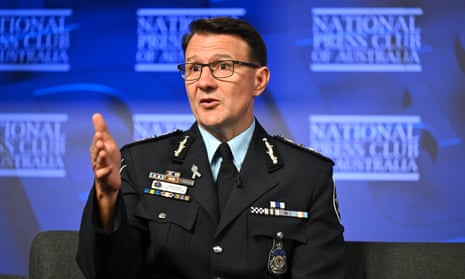The Australian federal police are conducting an internal review to determine whether any officers leaked material or otherwise breached professional standards in handling evidence obtained for the criminal investigation and rape trial of the former ministerial adviser Bruce Lehrmann.
The AFP commissioner, Reece Kershaw, told the National Press Club on Wednesday that an examination of those processes was under way.
“We are reviewing that material and that case as we speak,” Kershaw said.
He was responding to a question about the leaking of personal text messages from the phone of Brittany Higgins, Lehrmann’s former colleague who accused him of having raped her in their ministerial office at Parliament House in 2019, and whether action might be taken against anyone as a result of the leak.
“Without me getting technical, there is not an investigation,” Kershaw continued. “But reviewing the material to see if there is a threshold for an investigation.”
The private messages had been part of an evidence brief for Lehrmann’s criminal trial but were never tendered in court. In separate civil defamation proceedings recently concluded in the federal court, in which Lehrmann was found on the balance of probabilities to have raped Higgins, Lehrmann was accused of leaking material from the evidence brief to the Seven Network’s Spotlight program.
It is alleged in the case that the leak breached a rule, known as the Harman principle and laid out in a high court judgment from a 2008 case, Hearne v Street. The principle specifies that evidence provided under compulsion by the court for one set of legal proceedings cannot be used for any other purpose.
Lehrmann has always denied the rape allegation and pleaded not guilty at the criminal trial of the matter.
Guardian Australia understands the review to which Kershaw referred is an internal AFP review to examine whether any police officer breached professional standards in the handling of evidence relating to the Lehrmann prosecution. This follows allegations levelled against police after the criminal trial, which collapsed due to juror misconduct and was discontinued out of concern for Higgins’ mental health.
An internal AFP professional standards review is a separate process from any investigation of allegations that other people may have leaked confidential material in relation to the Higgins-Lehrmann matter.
The AFP said it would offer no further comment.
In his ruling on Lehrmann’s defamation action against Network Ten and its former presenter Lisa Wikinson, the federal court justice Michael Lee said he was “comfortably satisfied” Lehrmann had lied about his role in leaking text messages between Higgins and others to Seven’s Spotlight program.
“Consistently with the instructions provided to his lawyers, Mr Lehrmann gave evidence during the trial to the effect that he did not give documents to the Seven Network, he just gave an interview,” Lee said.
after newsletter promotion
“As I explained at the trial, I am not some sort of roving law enforcement official, and if any issue concerning an alleged breach of the Hearne v Street obligation is to be pursued in relation to anyone, it will not be by me, and it will not be by this court.”
Breaching the Harman principle could lead to a charge of contempt of court if a person gives those documents to people outside of the case “without reasonable excuse”, a spokesperson for the ACT’s justice agency said.
The decision over whether to investigate Lehrmann for any potential contempt of court now lies with the ACT director of public prosecutions, whose office made the decision to discontinue the rape prosecution in 2022.
The office of the ACT Director of Public Prosecutions told Guardian Australia that its acting director, Anthony Williamson SC, “notes the public comments made by AFP Commissioner Kershaw at the National Press Club”.
“It is not the practice of the DPP to comment on ongoing police inquiries or investigations,” it said in a written response to questions about whether any action was being contemplated for an alleged breach of the Harman principle.
“To do so has the capacity to compromise the right of a person to a fair trial. Discussions between the DPP, his or her prosecutors, and/or the police in relation to police investigations and possible charges that might be brought against a person are the subject of legal professional privilege.”
